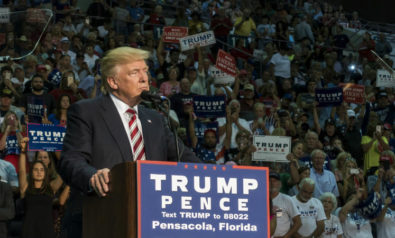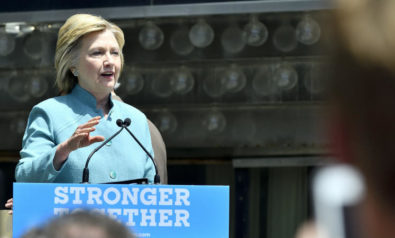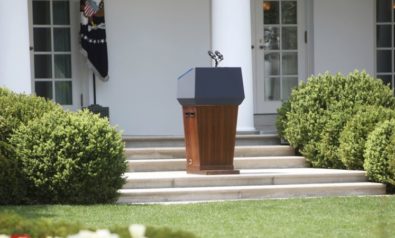Fact-based policy initiatives and requisite governing experience do not seem to matter to a great many American voters.
The first US presidential “debate” is just around the corner. With both major candidates racing to the bottom, this debate takes on added significance in determining which of two candidates that nobody likes will outlast the other. America is likely to lose either way, but it would surely be nice if there were a discussion that challenged the candidates to do something beyond regurgitation of the tired squawking points that have left many Americans dispirited.
Since these presidential “debates” don’t require any intellectual honesty of the participants, and there is no penalty for failing to answer the question asked, it will be up to the moderator to impose order, push each candidate to answer each question, and have a euphemism for “bullshit” at the ready when a candidate simply does not tell the truth.
In addition, it would be really helpful if the moderator is smart enough to think outside the simplistic conventional box, and is fully committed to asking defining questions and to sticking with each question until there is a defining answer.
Questions for Donald Trump and Hillary Clinton
So to try to help out, I would like to suggest a few questions that I think require some type of meaningful answer from each candidate. The follow-up questions are really important.
We’ll kick it off with race and police violence:
1) Mr. Trump/Secretary Clinton, what does the phrase “black lives matter” mean to you?
2) Do you personally believe that police officers should be held criminally responsible when allegations of unjustified killing of citizens can be proven by available evidence? If so, do you believe that the legal framework presently exits to ensure that accountability when young black men are killed?
3) Besides studying the problem or naming a commission, what is the first concrete policy proposal that you would advance to address the perception/reality that police officers are killing young black men in America at an alarming rate?
Next up is god and public policy:
1) Mr. Trump/Secretary Clinton, when you use the phrase “God Bless America” in your public discourse, what do you mean by it? What exactly are you asking your god to do for America? Do you believe that your god actually hears and honors your requests?
2) What do you say to the millions of Americans who think that god, yours or anybody else’s, has no place in governance or public policy and that you should keep your faith to yourself, allowing it to guide you and you alone?
3) If you believe that your god has an important place in governance and public policy, shouldn’t it have a similar place for the hundreds of millions of Muslims living in predominantly Muslim countries whether you like their god’s laws or not?
On to gun violence and gun rights:
1) Mr. Trump/Secretary Clinton, do you think that over 33,000 firearm deaths a year in the US is an acceptable price to pay for the Second Amendment “right to bear arms,” as that term has been defined by the Supreme Court? If not, what specifically would you propose to do about it beyond expanded background checks?
2) What does the term “gun-free zone” mean to you? As you define it, should there be gun-free zones in America? If so, give some examples that meet your definition. If not, explain to the parents of college students and the students themselves why you are comfortable with armed teachers and armed students on college campuses.
3) Should the parents of a child murdered by someone armed with a legally-purchased semi-automatic weapon have the legal right to sue the manufacturer of the semi-automatic weapon? If not, should the parents of a child killed in an automobile accident where brakes failed have the legal right to sue the manufacturer of the brakes that failed? If your answer is yes, try to explain both the factual and legal difference in these cases.
Next, how about nuclear nonproliferation:
1) Mr. Trump/Secretary Clinton, explain your understanding of the core provisions of the Treaty on the Nonproliferation of Nuclear Weapons, including your understanding of the three pillars of the treaty.
2) Do you believe that the United States benefits from this treaty, which has been in effect since 1970? Do you believe that, in spite of this treaty, the United States can share nuclear weapons technology with Japan, South Korea or Ukraine if the US believes it to be in our national interest to do so?
 Subscribe to Fair Observer for $10 a month and we will gift you our e-publications and invite you to inspiring events.
Subscribe to Fair Observer for $10 a month and we will gift you our e-publications and invite you to inspiring events.
3) Iran, which does not have a nuclear weapon, has signed this treaty, but India, Pakistan and Israel have nuclear weapons and have not signed the treaty. If sanctions are/were appropriate against Iran to prevent nuclear weapons development, should we use similar sanctions against nuclear states that have refused to sign the treaty in order to prevent proliferation of the technology that they have already? Apply your logic to North Korea.
Take Note of Brexit
While this is hardly an exhaustive list of potential questions, it is a representative list of the type of questions and well-defined follow-up with any potential to move the candidates to actually address public policy issues that should be of importance to voters. Without this level of depth, the nation will be forced to endure yet another round of the pandering to entrenched bases that has been the hallmark of this interminable election cycle.
Yet it may not matter at all. For some reason, fact-based policy initiatives and requisite governing experience do not seem to matter to a great many voters. The prospect is very real that millions of Americans will vote without reference to the substantive considerations that should drive public policy.
As in Great Britain with the Brexit vote, way too many voters seem to want change without taking the time to understand the specifics of the change they are choosing or its likely impact on their lives.
*[A version of this article was also featured on Larry Beck’s blog, Hard Left Turn.]
The views expressed in this article are the author’s own and do not necessarily reflect Fair Observer’s editorial policy.
Photo Credit: Evgeny Gromov
Support Fair Observer
We rely on your support for our independence, diversity and quality.
For more than 10 years, Fair Observer has been free, fair and independent. No billionaire owns us, no advertisers control us. We are a reader-supported nonprofit. Unlike many other publications, we keep our content free for readers regardless of where they live or whether they can afford to pay. We have no paywalls and no ads.
In the post-truth era of fake news, echo chambers and filter bubbles, we publish a plurality of perspectives from around the world. Anyone can publish with us, but everyone goes through a rigorous editorial process. So, you get fact-checked, well-reasoned content instead of noise.
We publish 2,500+ voices from 90+ countries. We also conduct education and training programs
on subjects ranging from digital media and journalism to writing and critical thinking. This
doesn’t come cheap. Servers, editors, trainers and web developers cost
money.
Please consider supporting us on a regular basis as a recurring donor or a
sustaining member.
Will you support FO’s journalism?
We rely on your support for our independence, diversity and quality.














































